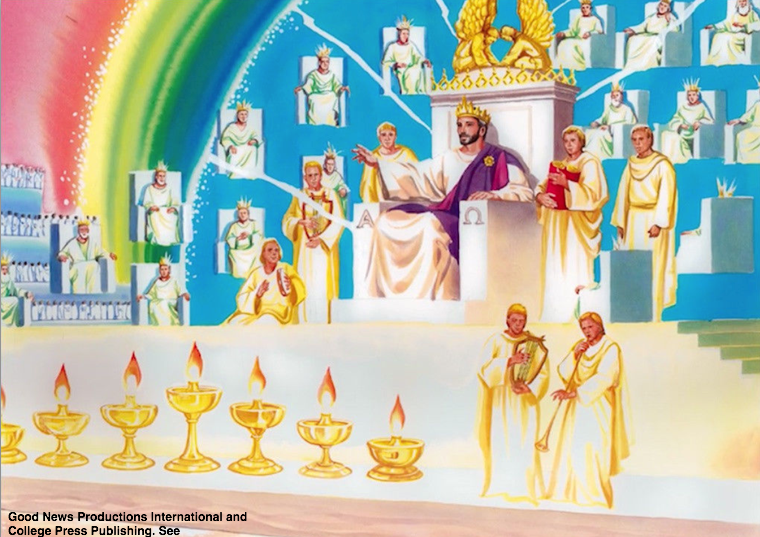“And when He has come, He will convict the world of sin, and of righteousness, and of judgment.” John 16:8
After Jesus forewarned His disciples of the world’s coming hostility and persecution of them (15:18-16:4), He began to encourage them with the Holy Spirit’s ministry that would take place while He was gone. Last time we learned that we can overcome fear in evangelism when we GRASP THAT WE ARE NOT ALONE WHEN WE WITNESS (John 16:5-7) because God the Holy Spirit permanently indwells every believer in Jesus.
The second way for us to overcome fear in evangelism is to GIVE UNBELIEVERS THE TRUTH OF THE GOSPEL AND LET THE HOLY SPIRIT CONVINCE THEM IT IS TRUE (John 16:8-11). In John 15:27, Jesus told His disciples to “bear witness” about Him. However, He also told them it would not be easy. Some would put them out of the synagogues and even kill them (John 16:2). In the midst of this distressing news, He offers them encouragement by introducing them to the convicting work of the Holy Spirit.
Jesus says of the Holy Spirit, “And when He has come, He will convict the world of sin, and of righteousness, and of judgment.” (John 16:8). What does the word “convict” (elegchei) mean? It means to “convince someone of something.” 1 John is using this word in a legal sense here. When a prosecuting attorney presents his case in such a way that demonstrates that something is true, he convicts his listeners. However, this does not mean that the Holy Spirit forces someone to believe something is true. A person can hear compelling evidence that something is true and still reject it. 2
The Holy Spirit assists people in coming to faith in Christ. It is the responsibility of the Holy Spirit to convince non-Christians in three areas. What are they? “Of sin… righteousness and judgment.” Notice the implied tenses of these nouns: past “sin,” present “righteousness,” and future “judgment.” 3 When the gospel is preached, it is the Holy Spirit Who convicts people of their “sin,” and that they need God’s “righteousness” through faith in Jesus, because without it, they will face certain “judgment” without hope of anything but eternal condemnation.
Beginning in verse 9, Jesus explains why the Holy Spirit convicts the world in these three areas. “Of sin, because they do not believe in Me.” (John 16:9). The word “sin” (hamartias) means “to miss the mark or standard.” 4 All people fall short of God’s perfect righteousness because “all have sinned” (Romans 3:23) against God through their thoughts, words, actions, and motives.
Yet the world tries to persuade people that they are not sinners. Many secular scientists and psychologists seem bent on destroying peoples’ awareness of sin. They may say that all people are inherently good. As a result, many people have a difficult time admitting they are guilty of sin. Oh, they may admit that they make mistakes or have failures and vices, but it is very difficult for them to admit that they have sinned against God. Even some churches say that people are not that bad and because God is love, He will accept everyone into heaven.
But the ultimate proof of the world’s sinfulness, Jesus says, is that “they do not believe in Me.” A court of law can convict someone of murder or theft, but only the Holy Spirit can convict someone of unbelief toward Christ. The Holy Spirit can convict people of their individual sins they have committed, but people can clean up their own lives and still go to hell. It is the sin of unbelief toward Jesus Christ that condemns people to an eternity in hell (John 3:18). 5 That is why the Bible says that “Anyone not found written in the Book of Life was cast in to the lake of fire.” (Revelation 20:15). Those who refuse to believe in Jesus will not have their names written in the Book of Life.
Unbelievers are judged according to their works to determine their degree of punishment in the lake of fire (Revelation 20:12-13; cf. Matthew 23:14; Mark 12:40), not their eternal destination. But their condemnation and placement in the lake of fire is because of their unbelief toward the Lord Jesus Christ (Revelation 20:15; cf. John 3:18).
So we see first, that the Holy Spirit wants to convict non-Christians of their sinfulness because they refuse to believe or trust in Jesus Christ alone as their only way to heaven. Because faith in Christ and His full payment for sin on the cross (John 19:30) is the only solution to our sin problem, the Holy Spirit wants to convict people of their sinful condition, so they can see their need to believe or trust in Jesus alone. The Holy Spirit is the prosecuting attorney who presents God’s case against sinful humanity. He creates an awareness of sin so that it cannot be dismissed or excused or evaded by taking refuge in the fact that “everybody is doing it.” When we are convicted of our sin, we admit to God that we have been wrong in our unbelief toward Jesus and then we believe or trust in Him alone, so we can approach God the Father in heaven.
The reason why the Holy Spirit convicts the world in the area of “righteousness” is explained in the next verse. “Of righteousness, because I go to the Father and you see Me no more.” (John 16:10). The Holy Spirit convicts the world “of righteousness,” because Jesus would suffer and die for our sins and rise from the dead and “go to” His “Father” in heaven, proving that He was the perfect Son of God. Had Jesus not been the perfect Son of God, the Father would not have received Him in heaven. Because God has no sin, Jesus could not enter into His presence in heaven if He were not righteous. For people to be accepted by God and able to enter into His heaven, they must measure up to Christ’s righteousness. No human being can accomplish this on their own. 6
This is why the Holy Spirit wants to convict the world that their righteousness before God depends not on their good works, but upon the finished work of Christ on the cross for them. Jesus’ life, death, resurrection, and ascension to heaven prove that He was the perfect Son of God. Christ’s righteousness is what satisfied God’s holy demand to punish sin, not our own righteousness.
When sharing the gospel with the unsaved, they may respond by saying, “I’m not as bad as him or her” or “I have not murdered anyone or committed adultery like so and so…” But God is not measuring our righteousness based on what other people have done or not done. He is measuring our righteousness based on what His Son, Jesus Christ, has done, and all of us fall short of Jesus’ perfection (Romans 3:23). Jesus never, ever told a lie. But we lie to ourselves and others daily. Christ never had one unkind thought. But we average a minimum of five a day. God’s Son never hated His enemies. But sometimes we can’t even stand the person we are married to or live with. So when it comes to behavior, in God’s eyes, we do not measure up. All of us fall short of Jesus’ perfection. Christ is the only Person Who never sinned (cf. 2 Corinthians 5:21; Hebrews 4:15; I Peter 3:18). Therefore, we must trust in Christ alone to be declared totally righteous before God.
“But to him who does not work, but believe on Him who justifies the ungodly, his faith is accounted for righteousness.” (Romans 4:5). When you trust in Christ alone for His gift of righteousness, God looks at your sin as covered by Jesus’ shed blood on the Cross. He takes the righteousness of His Son and places it on you. Therefore, you can stand before a holy God with the perfect righteousness of Jesus.

Henry Ironside shares a helpful illustration about what it means to be justified before God. One morning on his way to a sheep ranch, he noticed a very peculiar sight. He saw an old ewe loping across the road followed by the strangest looking lamb he had ever seen. It seemed to have six legs, and the last two were hanging helplessly as though paralyzed. When one of the sheep ranchers caught the lamb and brought it over to Ironside, the rancher explained that the lamb did not really belong to that ewe. She had a lamb that was bitten by a rattlesnake and died. This lamb that Ironside saw was an orphan and needed a mother’s care. But at first the ewe refused to have anything to do with it. She sniffed at it when it was brought to her, then pushed it away, saying as plainly as a sheep could say it, “That is not my lamb!” So the ranchers skinned the lamb that had died and covered the living lamb with the dead lamb’s skin. When the covered lamb was brought again to the ewe (see above photo), she smelled it once more and accepted the lamb as her own as if to say, “That is Mine!”
Like that orphan lamb, all people are born as outcasts, separated from God because of their sin. But God’s only perfect Son, Jesus Christ, the Lamb of God (John 1:29), died in our place on the cross and rose from the dead, so that when we believe or trust in Him alone, we are clothed with His righteousness. God can accept us into His family now because He sees the righteousness of His Son instead of our sin. He can say, “That is Mine!”
“Of judgment, because the ruler of this world is judged.” (John 16:11). The reason the Holy Spirit convicts the world “of judgment” is “because the ruler of this world [Satan] is judged” already in heaven by God (Isaiah 14:12-15; Ezekiel 28:12-19), and will shortly be judged at the cross (cf. John 12:31; Colossians 2:15), and later confined to the lake of fire at the end of the Millennial Kingdom (Revelation 20:2, 7-10). The word “judged” (kekritai)is in the perfect tense and passive voice which means Satan was judged by God in the past and remains condemned today. Like a convicted criminal, Satan awaits his execution when he will be cast into the lake of fire to “be tormented day and night forever and ever” (Revelation 20:7-10).
The Holy Spirit wants to convince people that if they refuse to believe in Jesus for His gift of righteousness, then they will experience the same eternal “judgment” as the Devil. His judgment is fixed and permanent. Satan’s eternal judgment guarantees that all who are in his kingdom through unbelief will also be condemned. If a person dies without believing in Christ alone for His gift of everlasting life, their condemnation cannot be lifted. It is permanent (cf. Hebrews 9:27). There are no second chances after you die.
Many people today, including Christians, do not believe in hell or eternal punishment even though Jesus and the apostles taught about its reality (cf. Matthew 5:22, 29-30; 10:28; 13:40-42, 47-50; 18:9; 23:33; 25:46; Mark 3:29; 9:43, 45, 47; Luke 12:5; 16:19-31; John 3:18, 36b; James 3:6; 2 Peter 2:4, 17; Jude 1:7, 13; Revelation 14:9-11; 19:20; 20:10, 14-15; et al.). But it is not our responsibility to convince them of the reality of hell. The Holy Spirit will do this as we preach the gospel to a lost world.
It is the Holy Spirit Who can convince a typical non-Christian who has no sense of his own sinfulness, who sees no need for God’s righteousness, and who pays no attention to the warnings of coming judgment. It is not our responsibility to convince people of the truth of the gospel; that responsibility belongs to the Holy Spirit. Our job is to clearly and effectively communicate the truth of the gospel and let the Holy Spirit convince them that it is true.
In February 2017 when I was flying to Northern Samar for a mission trip in the Philippines, I sat next to a Filipino law school student who visited with me about President Trump. She made it clear to me she did not like President Trump and nor could she understand how I could like him. She was getting very angry as I shared my supporting views about the President and his policies. As our conversation progressed, I began praying for the Lord to give me wisdom on shifting the focus from politics to the gospel.
A few minutes later, I said to her, “I really would like to share with you about something far more important than politics.” “Really?!” She exclaimed. “What could that be?!” I said, “How you can know for sure from the Bible how you can go to heaven when you die.” “Oh,” she said quietly. Then I asked her, “May I share from the Bible how you can know for sure you will go to heaven when you die?” She said, “Yes.” I then shared the bad news (Romans 3:23; 6:23) good news (I Corinthians 15:1-6; John 3:16) approach with her. Afterward, she indicated she was now trusting in Christ alone as her only way to heaven. Her whole demeanor softened as the gospel was shared with her. I am convinced that the Holy Spirit convicted her of her sin and her need for the Savior, so she could escape the eternal judgment that awaits those who refuse to believe or trust in Christ alone for His gift of salvation.
When we realize that the Holy Spirit is already at work in the hearts and minds of unbelievers around us to persuade them of their own sinfulness and their need for Christ’s righteousness to escape the eternal judgment of God, we will have more confidence to share the gospel with the unsaved world. Knowing of the Holy Spirit’s convicting work among the unsaved can also give us a greater sense of expectancy as we proclaim the good news of Christ’s death and resurrection, inviting the unsaved to believe in Jesus alone as their only hope of heaven.
Prayer: Lord Jesus, it is with a heap of gratitude that I approach You right now. Without the convicting work of the Holy Spirit in the world, there would be no reason to expect a bountiful harvest when we share the gospel with the lost. But because the Spirit of God is already at work persuading non-Christians of their sin so they may see their need to believe in Jesus for His gift of righteousness to escape the same eternal judgment as Satan, we can boldly share Christ with them. Please enable us to clearly communicate the truth of the gospel to the lost as we rely on the Holy Spirit to convince them that it is true. In Your precious name we pray, Lord Jesus. Amen.
ENDNOTES:
1. A Greek-English Lexicon of the New Testament and Other Early Christian Literature, compiled by Walter Bauer, trans. and adapted by William F. Arndt and F. Wilbur Gingrich, 2nd ed., rev. and augmented by F. Wilbur Gingrich and Frederick W. Danker (Chicago: University of Chicago Press, 1979), pg. 249.
2. Robert N. Wilkin, “The Gospel According to John,” The Grace New Testament Commentary, Vol. 1: Matthew – Acts (Denton, TX: Grace Evangelical Society, 2010), pg. 453.
3. Tom Constable, Notes on John, 2017 Edition, pg. 298-299.
4. Archibald Thomas Robertson, Word Pictures in The New Testament, Vol V: John and Hebrews (Grand Rapids: Baker Book House, 1932), pg. 267.
5. Constable, pg. 300.
6. The Evangelism Study Bible (Grand Rapids: Kregel Publications, copyright 2014 EvanTell, Inc.), pg. 1187.



